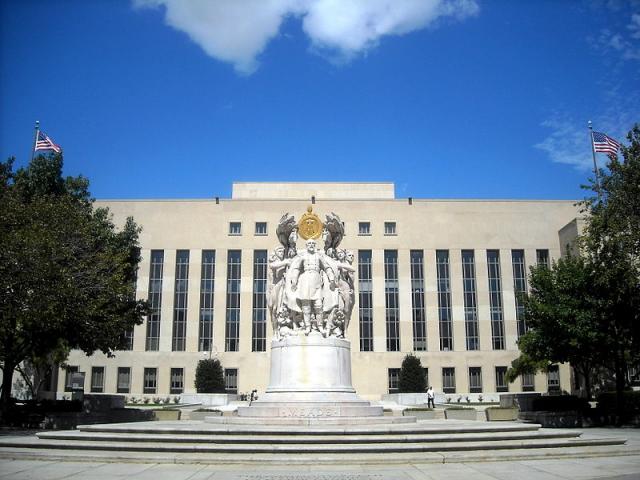Tomorrow, we may see a court—the highest in the land–flout precedent for partisan ends in its ruling on President Obama’s signature health care law.
However, in the meantime, we can rejoice that the U.S. Court of Appeals for the District of Columbia Circuit understands how to weigh complicated science-policy issues without partisanship or bias.
The D.C. Circuit recently came down with a long expected ruling on an industry and state attorneys general challenge to the EPA’s Endangerment Finding, as well as a number of other actions regarding greenhouse gas regulations. These representatives of red states (including Ken Cuccinelli) and affected corporations argued that EPA was in the wrong to determine that greenhouse gases endanger public health and welfare, and thus must be regulated. Rather, they argued, EPA had come up with an arbitrary and capricious reading of climate science—and was set to unleash an onerous regulatory regime on this misguided basis.
To put it simply, for this charge to be true, all the experts on global warming would have to be wrong. Because that’s precisely who EPA relied on—including the IPCC, the U.S. Global Change Research Program, and the National Academy of Sciences.
What the D.C. Circuit opinion does, basically, is to show that EPA is absolutely right to trust the experts, and to ignore the deniers, in deciding what the science of global warming says. That makes the D.C. Circuit opinion a resounding defense of science and its relevance to policy—in many ways on a par with other such legal classics, like Judge Jones’ decision in the Dover evolution trial.
Perhaps most quotable is the court’s devastating retort to the idea that EPA shouldn’t be relying on expert scientific assessments to make its judgment about whether humans are causing global warming:
State and Industry Petitioners assert that EPA improperly “delegated” its judgment to the IPCC, USGCRP, and NRC by relying on these assessments of climate-change science. This argument is little more than a semantic trick. EPA did not delegate, explicitly or otherwise, any decision-making to any of those entities. EPA simply did here what it and other decisionmakers often must do to make a science-based judgment: it sought out and reviewed existing scientific evidence to determine whether a particular finding was warranted. It makes no difference that much of the scientific evidence in large part consisted of “syntheses” of individual studies and research. Even individual studies and research papers often synthesize past work in an area and then build upon it. This is how science works. EPA is not required to re-prove the existence of the atom every time it approaches a scientific question.
Heh. Science deniers, as we know, are capable of arguing anything, due to the power of motivated reasoning–which, essentially, makes you act like a lawyer rather than a scientist. That includes engaging in all manner of “semantic tricks.” But outside observers who aren’t so motivated—which courts ought to be—tend to see right through it. So this smackdown is richly deserved.
Arguably better yet is the court’s response to the claim that there’s too much scientific “uncertainty” for EPA to regulate greenhouse gases:
[Industry petitioners] contend that the record evidences too much uncertainty to support that judgment. But the existence of some uncertainty does not, without more, warrant invalidation of an endangerment finding. If a statute is “precautionary in nature” and “designed to protect the public health,” and the relevant evidence is “difficult to come by, uncertain, or conflicting because it is on the frontiers of scientific knowledge,” EPA need not provide “rigorous step-by-step proof of cause and effect” to support an endangerment finding.
Honestly, by any reasonable assessment we are actually pretty darn certain now that humans are causing global warming. But in any event, the Clean Air Act doesn’t require scientific certainty before EPA can act. If it did, nothing would ever get done—as those who wrote the law knew very well.
Nor does administrative law require that courts, like the D.C. Circuit, second-guess expert agencies like EPA when it comes to what counts as science. Let’s quote the D.C. Circuit one last time:
In the end, Petitioners are asking us to re-weigh the scientific evidence before EPA and reach our own conclusion. This is not our role. As with other reviews of administrative proceedings, we do not determine the convincing force of evidence, nor the conclusion it should support, but only whether the conclusion reached by EPA is supported by substantial evidence when considered on the record as a whole. When EPA evaluates scientific evidence in its bailiwick, we ask only that it take the scientific record into account “in a rational manner.” Industry Petitioners have not shown that EPA failed to do so here.
And so, once again, when climate denier claims are subjected to serious and careful intellectual scrutiny—rather than handled carelessly in the media–they flop big time.
You can read the full D.C. Circuit opinion here.
Subscribe to our newsletter
Stay up to date with DeSmog news and alerts






